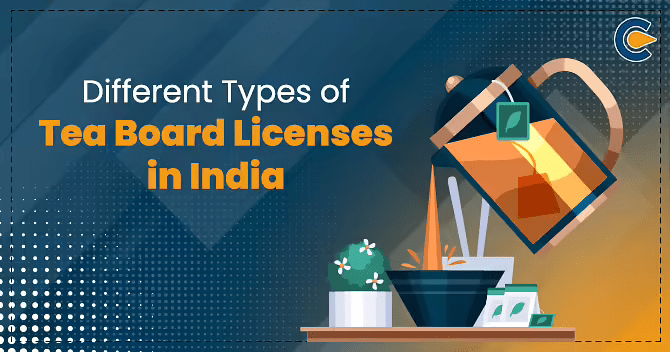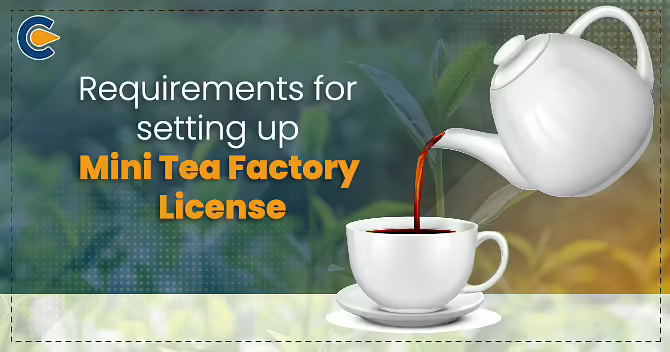According to Notification GSR 694(E), which was issued on 11th October 1999, no person can carry on the activities of manufacturing tea with added flavour without obtaining a Flavoured Tea Registration from the Tea Board as a bonafide manufacturer of flavoured tea, according to the order in respect of each factory owned or controlled by him.
An Overview of the Indian Tea Board
According to Section 4 of the Tea Act of 1953, the Tea Board was established as a statutory body on April 1st, 1954. It oversees the overall growth of the tea industry in its capacity as the top body. The Board comprises 32 members, including the Chairman and Deputy Chairman, representing various facets of the tea industry. The Tea Board’s duties and responsibilities include Flavoured Tea Registration, boosting output and productivity, enhancing tea quality, enabling the market, implementing welfare programs for plantation workers, and assisting with research and development. Another crucial duty of the Board is gathering, compiling, and distributing statistical data to all stakeholders. Being the regulatory body, the Board uses various control orders made public under the Tea Act to exert control over producers, manufacturers, exporters, tea brokers, auctioneers, and warehouse keepers.
Application for Flavoured Tea Registration
In order to obtain the Flavoured Tea Registration, the manufacturer is required to submit an application to the tea board office. The following things are required to be submitted in the application form-
- The applicant’s name is in block letters, along with the address of the registered office. If there is a partnership case, all partners’ names must be provided.
- Correspondence address along with telephone, fax, mobile, and e-mail numbers
- The manufacturing unit’s name and location
- Name of the flavour with its % per kg
- Natural Flavour
- Natural Flavouring substances
- Details of Technology patents, if available
- Regd. No. of flavours issued by the PFA authorities (Xerox copy)
- Factory License Number (provided by the State Authority)
- annual installed capacity
- Central Excise License or Registration Number (Xerox copy)
- Specifics of the Flavour Estimation Methodology
- A Sample Packet (125 grams Net each)
- tea exporter’s license no. if any (indicate the same)
- Declaration (in a stamp paper duly notarized).
Documents Required for Flavoured Tea Registration
Following are some vital documents required for Flavoured Tea Registration:
- For proprietorship concern: A declaration properly notarized on non-judicial stamp paper with a face value of at least Rs. 100 for a sole proprietorship, along with name and residential address.
- For a partnership firm, a properly witnessed Deed of Partnership signed by two or more partners (if the applicant is a partnership firm)
- For a company: properly certified Memorandum, Articles of Association, and Certificate of Incorporation (if the applicant is a company)
- Factory Registration Certificate of Tea Board (if applicable)
- a copy of any exporter or buyer licenses issued by the Tea Board
- a factory license from the state authority (if applicable)
- Good & Service Tax (GST) Certificate ( if applicable)
- Test Results for the FSSAI’s physical parameters from NABL-accredited labs used by the Tea Board
- Details on the estimation process for tea flavours
- Name, residential address, e-mail address, and contact information for the firm or company’s current partners, directors, and proprietors.
- Declaration made by the applicant in writing and signed in front of the Executive Magistrate stating that they will only use natural flavours and flavourings obtained solely through physical processing of plant-based materials in their natural state or following processing for human Consumption.
Procedure to Obtain Flavoured Tea Registration in India
To obtain the Flavoured Tea Registration, the applicant must submit their application to the licensing authority in the format specified below.
- Before submitting their application, ensure that the application is complete and includes all necessary documents and information, applicants are urged to review the guidelines and instructions carefully.
- The applicant must provide a phone number and e-mail address so the Tea Board can contact them immediately.
- The application form is submitted along with some self-attested documents, as we mentioned in this blog.
The application form should be filled and signed by the proprietor, partner, director, or authorized signatory, as appropriate, along with the date and an official office seal. (If the Authorized Signatory signs the application, an authorization letter should be included.) Incomplete applications will be rejected, and the applicant will need to reapply. If the first application is denied, the registration fee submitted with it will only be adjusted for the second fresh application; the applicant will be required to pay the registration fee for each additional new application.
The following self-attested documents are numbered and sealed:
- A properly completed application form bears the date and seal of the Owner, partner, director, or authorized signatory, as applicable.
- A copy of:
- Declaration properly notarized in a non-judicial setting for proprietorship concern Stamp paper price for a sole proprietorship of at least Rs. 100 With a name and home address.
- For a partnership firm, a properly witnessed Deed of Partnership Partners (if the applicant is a partnership firm) (if the applicant is a partnership firm).
For a company, the certificate of incorporation, the articles of association, and If the applicant is a company, then duly certified incorporation must be submitted.
- Factory Registration Certificate, if issued by the Tea Board.
- A copy of any exporter/buyer licenses issued by the Tea Board.
- Factory License, if applicable, issued by the State Authority
- If applicable, a Central Excise Certificate[1].
- A certificate issued by India’s Food Safety and Standards Authority.
- Original Test Report (FSSAI Parameters – Physical Parameters) from Tea Board hired NABL-certified labs.
- Details of the estimation methodology for tea flavours
- Name, residential address, e-mail ID and contact numbers of present Partners/Directors/Proprietor of the firm/company.
- The applicant’s declaration must be properly affirmed before the executive Magistrate, stating that the applicant will only use natural flavourings and Flavouring ingredients that are only obtained through the physical process for plant-origin materials in their natural state or after processing for human Consumption.
Conclusion
One of the industries brought under the control of the Union Government by a Parliamentary Act is the tea industry. The Indian Tea Cess Bill, passed in 1903, is when the Tea Board of India first came into existence. The Bill called for levying a tax on tea exports, with the money raised going toward promoting Indian tea domestically and internationally. On April 1st, 1954, the current Tea Board was established under Section 4 of the Tea Act of 1953. It was enacted to regulate the tea industry in the country following the International Agreement. It also regulated laws related to Flavoured Tea Registration. It provides for establishing a Tea Board that overlooks the Tea production in India. It helps to improve tea cultivation, grants licenses to entities engaged in Tea production, encourages scientific research and development in this sector and promotes labour welfare practices.
Read our Article:Different Types of Tea Board Licenses in India











